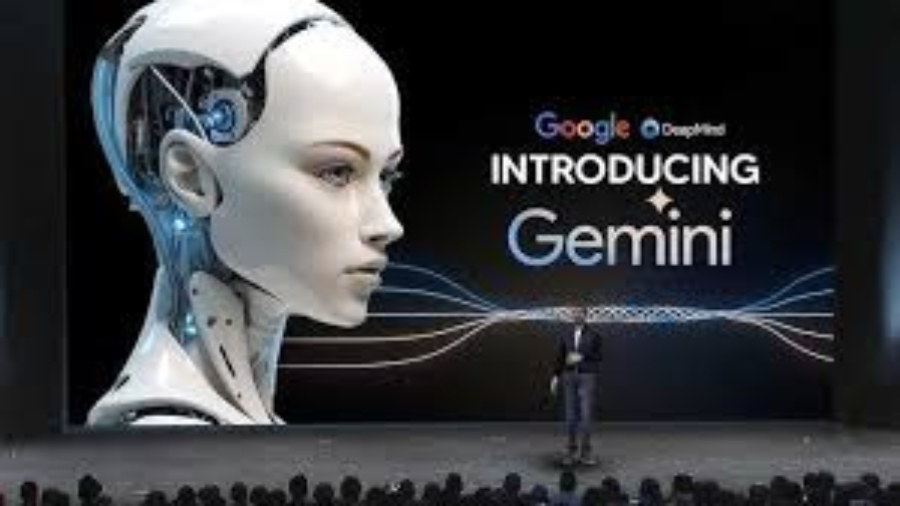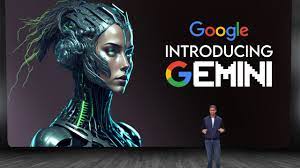In the quick advancing scene of artificial intelligence Google’s most recent endeavor, Gemini, is starting interest and hypothesis.
People, hold on to your hats because the field of artificial intelligence is about to undergo a significant advancement.
Could research Gemini really have a similar outlook as a human? Let’s investigate this cutting-edge development and how it will affect the future.Google’s Gemini, the most recent and most impressive artificial intelligence model, cases to have modern thinking skills, obscuring the lines among machine and human idea. Yet, might Gemini at any point really think like us? How about we investigate the thrilling prospects and difficulties that lie ahead in the domain of AI thinking.
What makes Gemini exceptional?
Gemini isn’t simply your normal talk bot. Several superpowers are possessed by this AI powerhouse:
Multimodal getting it: It can handle text, yet additionally pictures, video, sound, and even code! This permits it to get a handle on data in a lot more extravagant manner, very much like people do.
What makes Gemini exceptional?
Gemini isn’t simply your normal talk bot. Several superpowers are possessed by this AI powerhouse:
Multimodal getting it: It can handle text, yet additionally pictures, video, sound, and even code! This permits it to get a handle on data in a lot more extravagant manner, very much like people do.
AI reasoning has made a significant leap forward with Google Gemini. Created by Google’s exploration division, this venture means to improve artificial intelligence’s capacity to grasp and reason through data, reflecting human mental cycles. The fundamental objective is to make a computer based intelligence framework that processes information as well as deciphers it with a profundity of understanding much the same as human reasoning
Thinking and critical thinking: Gemini can dissect circumstances, reach inferences, and concoct arrangements – something past AI models battled with. In some benchmark tests, it even performed better than human experts!
Advanced Methods for Learning: Google Gemini integrates complex learning calculations that empower it to adjust and advance in view of the information it experiences.
Understanding the Situation: Gemini, in contrast to conventional AI, places an emphasis on contextual comprehension, which enables it to comprehend information’s nuances and subtle intricacies.
Will research Gemini Have a similar outlook as a Human?
Although Google Gemini is an innovative development, it is difficult to make the claim that it can completely replicate human thought processes. Human comprehension includes a heap of profound, instinctive, and experiential components that are trying to imitate. Gemini, on the other hand, aims to close this gap by enhancing AI’s capacity for more nuanced and context-aware data reasoning and interpretation.
Suggestions for What’s to come:
There will be significant repercussions for a wide range of industries if Google Gemini accomplishes its goal. The incorporation of human-like reasoning into AI may reshape how we interact with technology in a variety of ways, including more personalized user experiences and efficient problem-solving in complex situations.
Here are a few key contrasts:
Imagination and instinct: Imagination and intuition frequently drive human thought. While Gemini can produce inventive text designs, it misses the mark on flash of certified creativity that comes from human experience and feelings.
There will be significant repercussions for a wide range of industries if Google Gemini accomplishes its goal. The incorporation of human-like reasoning into AI may reshape how we interact with technology in a variety of ways, including more personalized user experiences and efficient problem-solving in complex situations.
Here are a few key contrasts:
Imagination and instinct: Imagination and intuition frequently drive human thought. While Gemini can produce inventive text designs, it misses the mark on flash of certified creativity that comes from human experience and feelings.
Using common sense and recognizing the context: People explore the world with an abundance of verifiable information and comprehension of subtleties. Gemini, as of now, depends on unequivocally customized data and may battle with inconspicuous prompts and unwritten guidelines.
Consciousness change: Human cognizance is a long lasting excursion, formed by our encounters and communications with the world. Gemini, be that as it may, is right now static in its abilities.
What does the future hold?
Gemini is a significant step toward truly intelligent AI, despite its limitations. It is a potent instrument that has the potential to alter educational, scientific, and healthcare settings.
As artificial intelligence innovation keeps on propelling, we can hope to see:
higher levels of sophistication in reasoning: Symbolic reasoning and probabilistic inference might be used in future AI models, blurring the lines between human and machine thought even more.
Improvement of counterfeit cognizance: While still distant, the journey for genuinely cognizant artificial intelligence may ultimately obscure the lines among human and machine knowledge in manners we can scarcely envision.
Moral contemplations: With more noteworthy artificial intelligence abilities come significantly more prominent obligations. Addressing issues like bias, transparency, and accountability, we must ensure that AI is utilized ethically and responsibly.
The main concern:
While Gemini can’t completely reproduce human idea, it prepares for a future where artificial intelligence can reason, take care of issues, and even advance close by us. The road to AI that is truly human-like is long and complicated, but with each new development, we get closer to a future in which humans and machines work together in new ways. In this way, lock in and prepare for a wild ride – the fate of artificial intelligence thinking is here, and it’s looking wonderful!
Remember: This is only the start of the discussion. The fate of AI thinking is completely open, and it depends on us to shape it capably and morally. Stay up to date, get involved, and let’s collaborate to create a future in which AI is to everyone’s advantage.
Website optimization watchwords: AI reasoning, Google’s Gemini, artificial intelligence, machine learning, natural language processing, AI that resembles humans, the future of AI, and AI ethics I hope that this comprehensive yet simple-to-understand article provides a comprehensive overview of the exciting advancements in AI reasoning, with a particular focus on Google’s Gemini. Keep in mind, the discussion doesn’t end here – continue investigating, learning, and adding to the dependable advancement of artificial intelligence!
Website optimization watchwords: AI reasoning, Google’s Gemini, artificial intelligence, machine learning, natural language processing, AI that resembles humans, the future of AI, and AI ethics I hope that this comprehensive yet simple-to-understand article provides a comprehensive overview of the exciting advancements in AI reasoning, with a particular focus on Google’s Gemini. Keep in mind, the discussion doesn’t end here – continue investigating, learning, and adding to the dependable advancement of artificial intelligence!





[…] generating content, Artificial intelligence is also transforming the writing process in a multitude of ways. Advanced grammar and plagiarism […]
I was suggested this website by my cousin. I’m not sure whether this post is written by him as nobody else know such detailed about my problem. You are incredible! Thanks!
Hi there, i read your blog occasionally and i own a similar one and i was just wondering if you get a lot of spam feedback? If so how do you protect against it, any plugin or anything you can advise? I get so much lately it’s driving me mad so any support is very much appreciated.
Very interesting topic, regards for putting up.
I would like to thnkx for the efforts you’ve put in writing this site. I’m hoping the same high-grade web site post from you in the upcoming as well. Actually your creative writing abilities has encouraged me to get my own website now. Actually the blogging is spreading its wings rapidly. Your write up is a great example of it.
certainly like your web site but you need to check the spelling on several of your posts. Many of them are rife with spelling problems and I find it very troublesome to tell the truth nevertheless I will certainly come back again.
Your place is valueble for me. Thanks!…
I have recently started a blog, the information you provide on this web site has helped me tremendously. Thanks for all of your time & work.
I would like to thank you for the efforts you have put in writing this web site. I’m hoping the same high-grade blog post from you in the upcoming also. Actually your creative writing skills has inspired me to get my own web site now. Actually the blogging is spreading its wings fast. Your write up is a good example of it.
As a Newbie, I am always exploring online for articles that can be of assistance to me. Thank you
It’s really a nice and helpful piece of info. I’m glad that you shared this helpful info with us. Please keep us up to date like this. Thanks for sharing.
Pretty! This was a really wonderful post. Thank you for your provided information.
My brother recommended I might like this blog. He was entirely right. This post actually made my day. You can not imagine just how much time I had spent for this info! Thanks!
Your place is valueble for me. Thanks!…
Some really superb info , Sword lily I discovered this. “What’s a man’s age He must hurry more, that’s all Cram in a day, what his youth took a year to hold.” by Robert Browning.